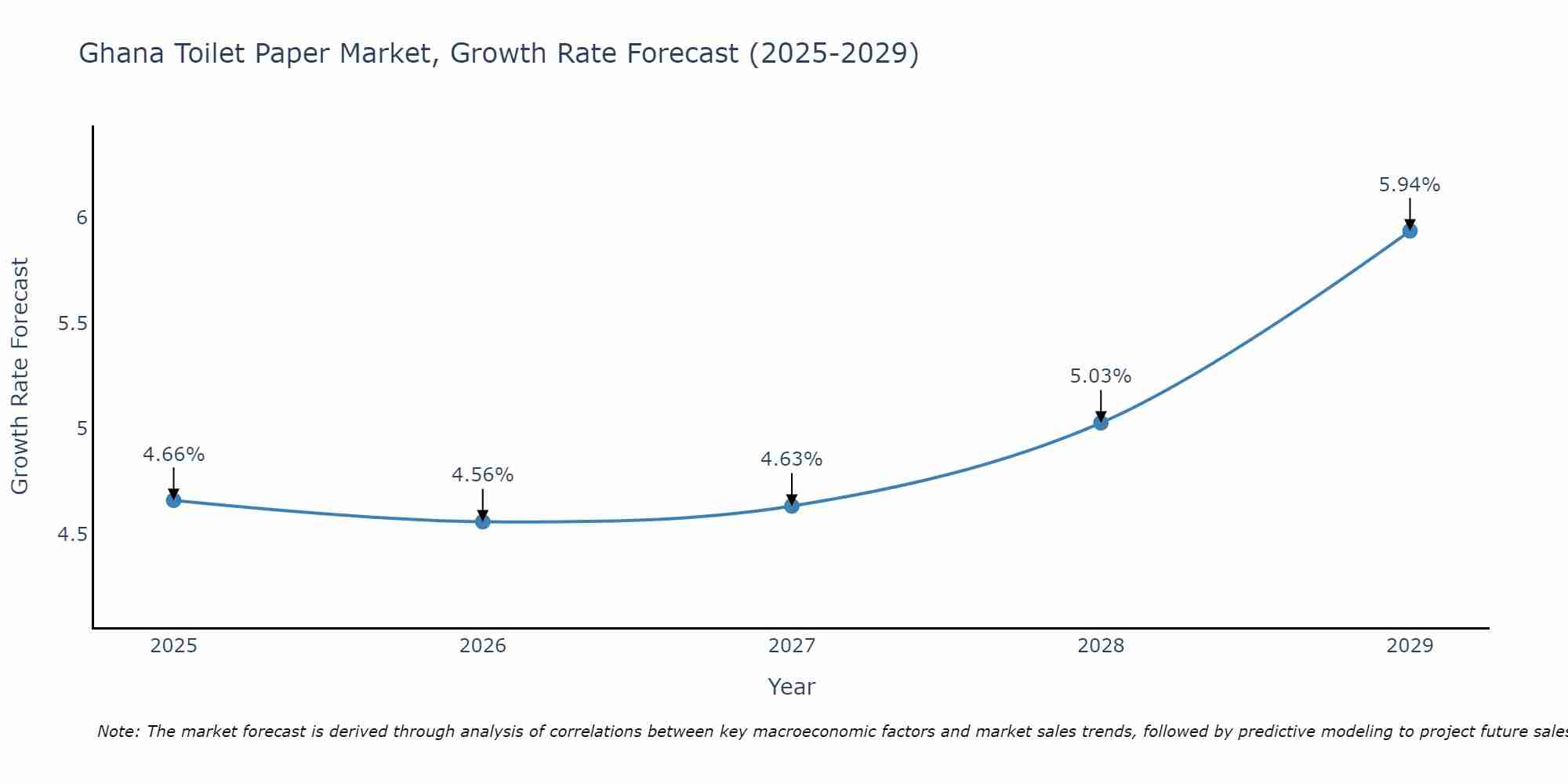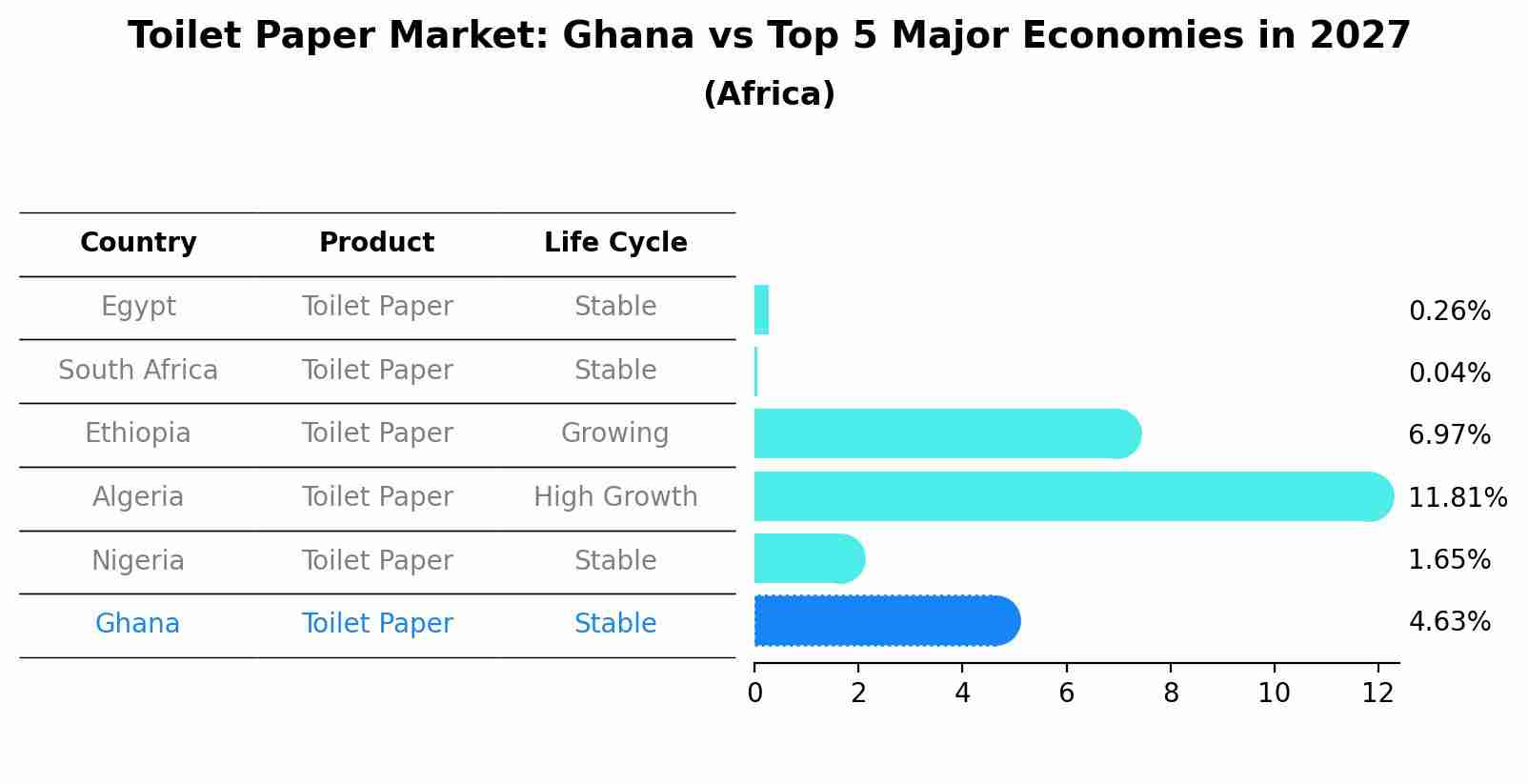Ghana Toilet Paper Market (2025-2031) | Forecast, Outlook, Value, Industry, Revenue, Analysis, Trends, Companies, Share, Size & Growth
| Product Code: ETC053316 | Publication Date: Jan 2021 | Updated Date: Jun 2025 | Product Type: Report | |
| Publisher: 6Wresearch | Author: Dhaval Chaurasia | No. of Pages: 70 | No. of Figures: 35 | No. of Tables: 5 |
Ghana Toilet Paper Market Size Growth Rate
The Ghana Toilet Paper Market is projected to witness mixed growth rate patterns during 2025 to 2029. The growth rate starts at 4.66% in 2025 and reaches 5.94% by 2029.

Toilet Paper Market: Ghana vs Top 5 Major Economies in 2027 (Africa)
By 2027, the Toilet Paper market in Ghana is anticipated to reach a growth rate of 4.63%, as part of an increasingly competitive Africa region, where Egypt remains at the forefront, supported by South Africa, Ethiopia, Algeria and Nigeria, driving innovations and market adoption across sectors.

Ghana Toilet Paper Market Overview
The Ghana toilet paper market is experiencing steady growth due to increasing urbanization, improving living standards, and a growing awareness of hygiene practices. The market is primarily dominated by major brands offering a variety of products ranging from standard to premium quality toilet paper. Consumers in Ghana are increasingly seeking softer, more absorbent, and environmentally friendly options, leading to a rise in demand for recycled and bamboo toilet paper alternatives. Distribution channels include supermarkets, convenience stores, and online platforms, with promotional activities playing a significant role in influencing consumer preferences. Overall, the Ghana toilet paper market is poised for further expansion as manufacturers focus on product innovation, sustainability, and affordability to cater to the evolving needs and preferences of consumers.
Ghana Toilet Paper Market Trends
The Ghana Toilet Paper Market is experiencing a significant shift towards eco-friendly and sustainable products, driven by increasing consumer awareness of environmental issues. There is a growing demand for recycled and biodegradable toilet paper options in response to concerns about deforestation and waste management. Manufacturers are focusing on promoting their products as environmentally friendly, using packaging that highlights the sustainable aspects of their toilet paper. Additionally, there is a trend towards premium and luxury toilet paper offerings, catering to consumers looking for higher quality and softer textures. E-commerce sales of toilet paper have also seen a rise, as more consumers opt for the convenience of online shopping. Overall, the Ghana Toilet Paper Market is evolving towards more sustainable and premium products to meet the changing preferences of consumers.
Ghana Toilet Paper Market Challenges
In the Ghana Toilet Paper Market, key challenges include inconsistent supply chain management leading to frequent stockouts, high import taxes on raw materials such as pulp, which increases production costs, and a lack of consumer awareness and education on the importance of hygiene products like toilet paper. Additionally, competition from lower-priced alternatives such as reusable cloth wipes poses a threat to market growth. Infrastructure constraints, including unreliable electricity supply and inadequate transportation networks, also impact manufacturing and distribution processes. Lastly, fluctuating exchange rates and economic instability can further hinder market growth and profitability for companies operating in the Ghanaian toilet paper market. Addressing these challenges will require strategic investments in supply chain optimization, consumer education campaigns, and advocacy for policy reforms to support the industry`s sustainable growth.
Ghana Toilet Paper Market Investment Opportunities
The Ghana toilet paper market presents promising investment opportunities due to the country`s growing population, increasing urbanization, and improving disposable income levels. With rising awareness of hygiene and sanitation practices, there is a growing demand for quality toilet paper products in both residential and commercial sectors. Investors can consider opportunities in manufacturing and distribution of toilet paper products, as well as exploring innovative and eco-friendly options to cater to the environmentally conscious consumer segment. Additionally, investing in marketing and branding strategies to differentiate products in a competitive market can also yield significant returns. Overall, the Ghana toilet paper market offers potential for growth and profitability for investors looking to tap into the country`s evolving consumer landscape.
Ghana Toilet Paper Market Government Policy
In Ghana, government policies related to the toilet paper market primarily focus on promoting hygiene and sanitation. The government has implemented initiatives to increase awareness about proper sanitary practices, including the importance of using toilet paper. Additionally, there are regulations in place to ensure the quality and safety of toilet paper products sold in the market. The government also supports local production of toilet paper to boost the economy and reduce reliance on imports. Overall, the policies aim to improve sanitation standards in the country and encourage the use of toilet paper as a hygienic option for personal care.
Ghana Toilet Paper Market Future Outlook
The future outlook for the Ghana Toilet Paper Market appears promising, with increasing awareness of hygiene practices and a growing population contributing to higher demand for toilet paper products. As urbanization continues and disposable incomes rise, consumers are expected to prioritize convenience and quality in their personal care products, further driving market growth. Additionally, the shift towards more sustainable and eco-friendly options is likely to influence consumer preferences, leading to a potential increase in the adoption of recycled or biodegradable toilet paper products in the market. Overall, the Ghana Toilet Paper Market is poised for expansion, offering opportunities for manufacturers to innovate and cater to evolving consumer needs in the coming years.
Key Highlights of the Report:
- Ghana Toilet Paper Market Outlook
- Market Size of Ghana Toilet Paper Market, 2024
- Forecast of Ghana Toilet Paper Market, 2026
- Historical Data and Forecast of Ghana Toilet Paper Revenues & Volume for the Period 2021 - 2031
- Ghana Toilet Paper Market Trend Evolution
- Ghana Toilet Paper Market Drivers and Challenges
- Ghana Toilet Paper Price Trends
- Ghana Toilet Paper Porter's Five Forces
- Ghana Toilet Paper Industry Life Cycle
- Historical Data and Forecast of Ghana Toilet Paper Market Revenues & Volume By Product Type for the Period 2021 - 2031
- Historical Data and Forecast of Ghana Toilet Paper Market Revenues & Volume By Pulp Paper for the Period 2021 - 2031
- Historical Data and Forecast of Ghana Toilet Paper Market Revenues & Volume By Recycled Paper for the Period 2021 - 2031
- Historical Data and Forecast of Ghana Toilet Paper Market Revenues & Volume By Application for the Period 2021 - 2031
- Historical Data and Forecast of Ghana Toilet Paper Market Revenues & Volume By Household for the Period 2021 - 2031
- Historical Data and Forecast of Ghana Toilet Paper Market Revenues & Volume By Commercial for the Period 2021 - 2031
- Ghana Toilet Paper Import Export Trade Statistics
- Market Opportunity Assessment By Product Type
- Market Opportunity Assessment By Application
- Ghana Toilet Paper Top Companies Market Share
- Ghana Toilet Paper Competitive Benchmarking By Technical and Operational Parameters
- Ghana Toilet Paper Company Profiles
- Ghana Toilet Paper Key Strategic Recommendations
Frequently Asked Questions About the Market Study (FAQs):
1 Executive Summary |
2 Introduction |
2.1 Key Highlights of the Report |
2.2 Report Description |
2.3 Market Scope & Segmentation |
2.4 Research Methodology |
2.5 Assumptions |
3 Ghana Toilet Paper Market Overview |
3.1 Ghana Country Macro Economic Indicators |
3.2 Ghana Toilet Paper Market Revenues & Volume, 2024 & 2031F |
3.3 Ghana Toilet Paper Market - Industry Life Cycle |
3.4 Ghana Toilet Paper Market - Porter's Five Forces |
3.5 Ghana Toilet Paper Market Revenues & Volume Share, By Product Type, 2024 & 2031F |
3.6 Ghana Toilet Paper Market Revenues & Volume Share, By Application, 2024 & 2031F |
4 Ghana Toilet Paper Market Dynamics |
4.1 Impact Analysis |
4.2 Market Drivers |
4.3 Market Restraints |
5 Ghana Toilet Paper Market Trends |
6 Ghana Toilet Paper Market, By Types |
6.1 Ghana Toilet Paper Market, By Product Type |
6.1.1 Overview and Analysis |
6.1.2 Ghana Toilet Paper Market Revenues & Volume, By Product Type, 2016 - 2031F |
6.1.3 Ghana Toilet Paper Market Revenues & Volume, By Pulp Paper, 2016 - 2031F |
6.1.4 Ghana Toilet Paper Market Revenues & Volume, By Recycled Paper, 2016 - 2031F |
6.2 Ghana Toilet Paper Market, By Application |
6.2.1 Overview and Analysis |
6.2.2 Ghana Toilet Paper Market Revenues & Volume, By Household, 2016 - 2031F |
6.2.3 Ghana Toilet Paper Market Revenues & Volume, By Commercial, 2016 - 2031F |
7 Ghana Toilet Paper Market Import-Export Trade Statistics |
7.1 Ghana Toilet Paper Market Export to Major Countries |
7.2 Ghana Toilet Paper Market Imports from Major Countries |
8 Ghana Toilet Paper Market Key Performance Indicators |
9 Ghana Toilet Paper Market - Opportunity Assessment |
9.1 Ghana Toilet Paper Market Opportunity Assessment, By Product Type, 2024 & 2031F |
9.2 Ghana Toilet Paper Market Opportunity Assessment, By Application, 2024 & 2031F |
10 Ghana Toilet Paper Market - Competitive Landscape |
10.1 Ghana Toilet Paper Market Revenue Share, By Companies, 2024 |
10.2 Ghana Toilet Paper Market Competitive Benchmarking, By Operating and Technical Parameters |
11 Company Profiles |
12 Recommendations |
13 Disclaimer |
- Single User License$ 1,995
- Department License$ 2,400
- Site License$ 3,120
- Global License$ 3,795
Search
Thought Leadership and Analyst Meet
Our Clients
Related Reports
- Canada Oil and Gas Market (2026-2032) | Share, Segmentation, Value, Industry, Trends, Forecast, Analysis, Size & Revenue, Growth, Competitive Landscape, Outlook, Companies
- Germany Breakfast Food Market (2026-2032) | Industry, Share, Growth, Size, Companies, Value, Analysis, Revenue, Trends, Forecast & Outlook
- Australia Briquette Market (2025-2031) | Growth, Size, Revenue, Forecast, Analysis, Trends, Value, Share, Industry & Companies
- Vietnam System Integrator Market (2025-2031) | Size, Companies, Analysis, Industry, Value, Forecast, Growth, Trends, Revenue & Share
- ASEAN and Thailand Brain Health Supplements Market (2025-2031) | Strategy, Consumer Insights, Analysis, Investment Trends, Opportunities, Growth, Size, Share, Industry, Revenue, Segments, Value, Segmentation, Supply, Forecast, Restraints, Outlook, Competition, Drivers, Trends, Demand, Pricing Analysis, Competitive, Strategic Insights, Companies, Challenges
- ASEAN Bearings Market (2025-2031) | Strategy, Consumer Insights, Analysis, Investment Trends, Opportunities, Growth, Size, Share, Industry, Revenue, Segments, Value, Segmentation, Supply, Forecast, Restraints, Outlook, Competition, Drivers, Trends, Demand, Pricing Analysis, Competitive, Strategic Insights, Companies, Challenges
- Europe Flooring Market (2025-2031) | Outlook, Share, Industry, Trends, Forecast, Companies, Revenue, Size, Analysis, Growth & Value
- Saudi Arabia Manlift Market (2025-2031) | Outlook, Size, Growth, Trends, Companies, Industry, Revenue, Value, Share, Forecast & Analysis
- Uganda Excavator, Crane, and Wheel Loaders Market (2025-2031) | Strategy, Consumer Insights, Analysis, Investment Trends, Opportunities, Growth, Size, Share, Industry, Revenue, Segments, Value, Segmentation, Supply, Forecast, Restraints, Outlook, Competition, Drivers, Trends, Demand, Pricing Analysis, Competitive, Strategic Insights, Companies, Challenges
- Rwanda Excavator, Crane, and Wheel Loaders Market (2025-2031) | Strategy, Consumer Insights, Analysis, Investment Trends, Opportunities, Growth, Size, Share, Industry, Revenue, Segments, Value, Segmentation, Supply, Forecast, Restraints, Outlook, Competition, Drivers, Trends, Demand, Pricing Analysis, Competitive, Strategic Insights, Companies, Challenges
Industry Events and Analyst Meet
Whitepaper
- Middle East & Africa Commercial Security Market Click here to view more.
- Middle East & Africa Fire Safety Systems & Equipment Market Click here to view more.
- GCC Drone Market Click here to view more.
- Middle East Lighting Fixture Market Click here to view more.
- GCC Physical & Perimeter Security Market Click here to view more.
6WResearch In News
- Doha a strategic location for EV manufacturing hub: IPA Qatar
- Demand for luxury TVs surging in the GCC, says Samsung
- Empowering Growth: The Thriving Journey of Bangladesh’s Cable Industry
- Demand for luxury TVs surging in the GCC, says Samsung
- Video call with a traditional healer? Once unthinkable, it’s now common in South Africa
- Intelligent Buildings To Smooth GCC’s Path To Net Zero


















